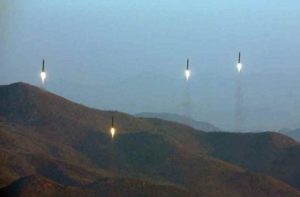by WorldTribune Staff, March 12, 2017
North Korea really is a growing nuclear threat, The Washington Post reported on March 11 following a week in which the Kim Jong-Un regime successfully launched four missiles into the Sea of Japan and a court upheld the impeachment of South Korea’s conservative president.
“U.S. officials are no longer seeing North Korea’s weapons tests as amateurish, attention-grabbing provocations,” the Post’s report said. “Instead, they are viewed as evidence of a rapidly growing threat — and one that increasingly defies solution.”

Pyongyang’s advancement in its nuclear and missile programs in the past year “have dramatically raised the stakes in the years-long standoff between the United States and the reclusive communist regime,” the report said, citing current and former U.S. officials and Korea analysts.
“Pyongyang’s growing arsenal has rattled key U.S. allies and spurred efforts by all sides to develop new first-strike capabilities, increasing the risk that a simple mistake could trigger a devastating regional war,” the analysts said.
“This is no longer about a lonely dictator crying for attention or demanding negotiations,” said Victor Cha, a former adviser on North Korea to the Bush administration and the Korea chair at the Center for Strategic and International Studies, a Washington think tank. “This is now a military testing program to acquire a proven capability.”
On Sept. 9, 2016, North Korea conducted its fifth nuclear weapons test. Scientific analyses of the test determined that the new bomb’s explosive yield approached 30 kilotons, two times the force of the “Little Boy” bomb dropped on Hiroshima, Japan, in 1945.
Pyongyang appears to be “on the verge of a nuclear breakout,” said Robert Litwak, an analyst on nuclear proliferation and director of International Security Studies at the Woodrow Wilson International Center for Scholars. He said North Korea’s arsenal is believed to now contain as many as 20 nuclear bombs, along with enough plutonium and highly enriched uranium to make dozens more.
“When I got into this field,” Litwak said at a symposium on North Korea this month, “I couldn’t have conceived of North Korea acquiring a nuclear arsenal approaching half the size of Great Britain’s.”
Jeffrey Lewis, an expert on North Korean weapons systems said: “This idea that these things were just bargaining chips — something that was true years ago — is superseded by the fact that there is now a rocket force . . . with a commander and a headquarters and subordinate bases, all with missiles. This is now a living, breathing thing.”
The North’s ICBM program “is real,” Lewis said. “They’ve showed us their static engine test. They showed us the mock-up of the nuclear warhead. They have done everything short of actually testing the ICBM. When they do test it, the first time it will probably fail. But eventually it will work. And when it works, people are going to freak out.”
